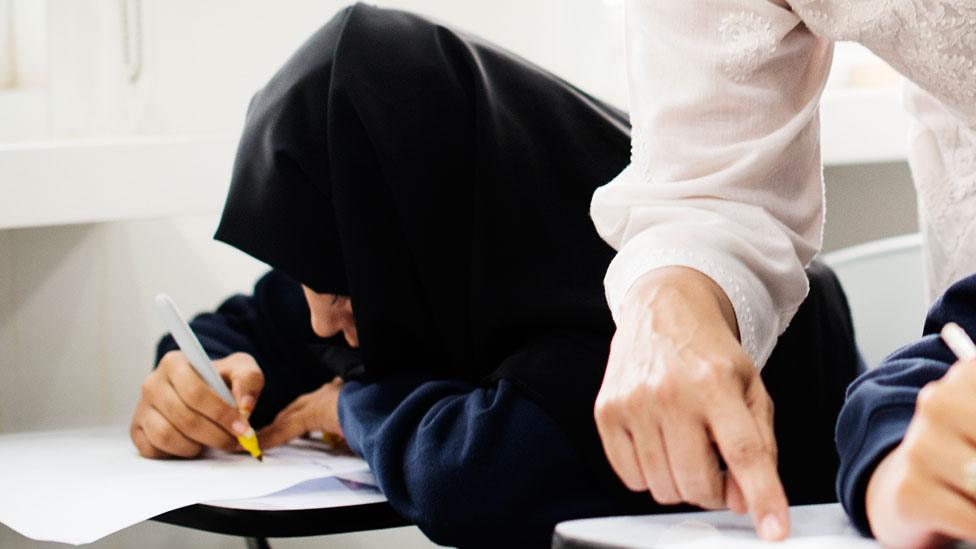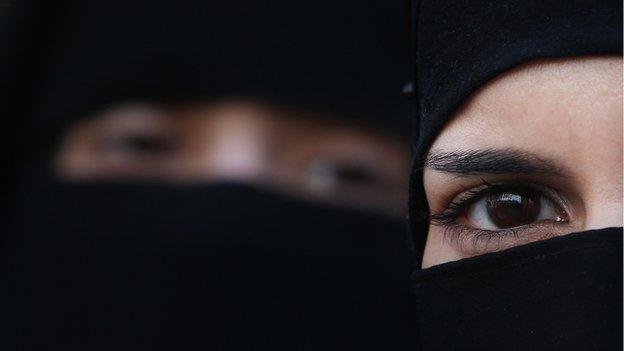Religious extremists 'trying to pervert education'
- Published

Religious extremists are using schools to narrow children's horizons and "pervert education", England's chief inspector of schools has warned.
Amanda Spielman said some community leaders see schools as vehicles to "indoctrinate impressionable minds" - with extremist ideology in some cases.
Ofsted inspectors are increasingly coming into contact with such extremists, she said.
She is asking head teachers to confront those who foster extremist behaviour.
It comes after an east London head teacher who tried to stop girls under the age of eight from wearing a hijab in the classroom was subjected to a campaign of abuse.
"Rather than adopting a passive liberalism that says anything goes, for fear of causing offence, schools leaders should be promoting a muscular liberalism," Ms Spielman has said at a conference held by the Church of England in London.
"That sort of liberalism holds no truck for ideologies that seek to close minds or narrow opportunity.
"Occasionally that will mean taking uncomfortable decisions or having tough conversations.
"It means not assuming that the most conservative voices in a particular faith speak for everyone."
She added: "Ofsted inspectors are increasingly brought into contact with those who want to actively pervert the purpose of education.
"Under the pretext of religious belief, they use education institutions, legal and illegal, to narrow young people's horizons, to isolate and segregate, and in the worst cases to indoctrinate impressionable minds with extremist ideology.
"Freedom of belief in the private sphere is paramount, but in our schools it is our responsibility to tackle those who actively undermine fundamental British values or equalities law."
'Tough decisions'
Ms Spielman has previously criticised practices in supplementary schools and some private faith schools.
She was understood to be making the speech in support of head teacher Neena Lall, of St Stephen's state primary in east London, who tried to prevent children under the age of eight from wearing the hijab in class.
Generally speaking, Muslim girls, although not all of them, wear the hijab after the age of 10.
Ms Lall also tried to stop younger pupils from taking part in Ramadan fasting during school hours.
'Campaign of abuse'
This prompted a backlash from some members of the local community and parents, although many parents voiced support for the move.
Ms Spielman said: "School leaders must have the right to set school uniform policies in a way that they see fit, in order to promote cohesion.
"It is a matter of deep regret that this outstanding school has been subject to a campaign of abuse by some elements within the community.
"I want to be absolutely clear - Ofsted will always back heads who take tough decisions in the interests of their pupils."
Ofsted said Ms Spielman was not targeting the Islamic faith, but all forms of fundamentalism.
'Little temptresses'
Dr Zubaida Haque, of the Runnymede Trust, told BBC News head teachers' attempts to ban the wearing of hijabs or other religious items in schools could contradict British values Ofsted was trying to promote, including mutual respect and tolerance of those with different faiths and beliefs.
She said that in most cases young girls wore the hijab because they wanted to be like their mothers.
It was not an issue of safeguarding and there had been no consultation with Muslim communities, she added.
A Department for Education official said: "Extremism has no place in our society - that's why we changed the law and the requirements on schools so that they have to actively promote the 'fundamental British values' of democracy, the rule of law, individual liberty, and the mutual respect and tolerance of those with different faiths and beliefs.
"If there are any allegations of schools promoting ideologies or discrimination in the classroom, we will not hesitate to take action."
Shaista Gohir, who chairs Muslim Women's Network UK, said: "The rising phenomenon of primary-school-aged girls wearing the hijab is certainly not an issue to trivialise.
"In continuing to defend this practice, what messages are being sent to these girls about their hair and body?
"Are we telling them they are little temptresses if they don't cover up?"

Analysis by Hannah Richardson
By wading into the thorny area of who should and should not wear a hijab, the Ofsted chief inspector may have inadvertently opened an old wound
Secular organisations, and in particular schools across Europe, have long grappled with this item of Muslim dress.
The veil is unique in that it is viewed as a symbol of multi-culturalism, sexism, coercion, women's liberation and community division all at once.
The focus here may be on young children's approach to this special piece of cloth. And the majority of Muslim girls do not adopt the hijab before the age of 10.
But is it the role of a head teacher to dictate who should and who should not be allowed to wear such an item? Even if they are in charge of uniform policies.
By calling on head teachers to exercise a "muscular liberalism" in the face of ultra-conservative forces, she may yet stir up more opposition than she anticipated.

- Published6 October 2016
- Published31 May 2018
